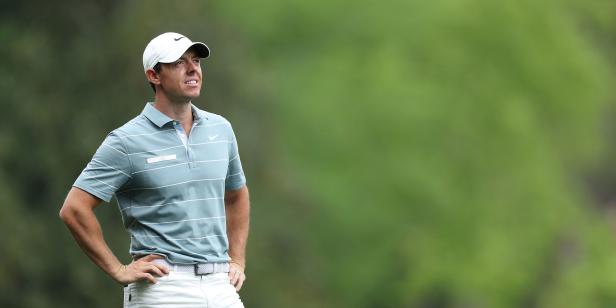Products You May Like
“Sooner or later I’m going to get rid of the bad stuff, and I’m going to be right there.” So said Rory McIlroy after another disappointing Masters? Actually, no. That was his assessment after converting 29 birdies, a personal best, while finishing T-17 at the Zozo Championship two weeks ago.
And yet, you can picture McIlroy uttering those same words after each of his 11 starts at Augusta National Golf Club, where he has collected nine top-25 finishes—the latest a T-21 in 2019—five top 10s, but no victories. Not that he needed to be reminded of that last part.
In fact, after his 2016 effort, one of his better chances to capture the only major missing from his resume and become the sixth player to complete the career Grand Slam, McIlroy did say, “I just didn’t play the golf I needed to when it really mattered. That’s the thing that I take away not just from this week, but from previous Masters.”
Get rid of the bad stuff.
Ranked fifth in the world and armed with a driver swing that will always make him dangerous at Augusta—or anywhere else—McIlroy is, naturally, among the favorites for this extraordinary November event at Augusta National. Perhaps the first Masters ever to be the last major of a year will bring a change of fortune for the 31-year-old native of Northern Ireland. Or maybe the knowledge that another shot at a green jacket is (fingers crossed) less than six months away will bring a level of relaxation that, he admits, is missing when he steps on the famed property.
“I like this more,” he said of the upcoming autumn visit to Augusta, Ga., for the 84th Masters. “There’s not as much hype, not as much, yeah, just noise. I sort of like this better.”
Not as much hype. Not as much noise.
Get rid of the bad stuff.
To do that, the former World No. 1 has to rid his game of loose strokes and smooth out some of the psychological creases that tend to wrinkle his brow and cause crooked numbers to creep onto his scorecard at Augusta at a rate unseen at any other event.
Like other apparent sure things before him at Augusta—Tom Weiskopf, Johnny Miller, Greg Norman and Ernie Els, all greats who couldn’t get both sleeves into a green jacket—McIlroy carries the unwieldy burden of talent, expectations and disappointment. With a healthy smattering of shock, too. The combination weighs on the soul.
McIlroy absorbed a well-documented collapse in 2011, when he led after each of the first three rounds but butchered the back nine on Sunday. The closing 80 left him tied for 15th—and tied up in knots ever since.
Prime opportunities for redemption have been limited in the succeeding years. In 2016, he was paired in the final twosome with Jordan Spieth during Saturday’s third round and proceeded to drop back with a 77. Two years later, he closed with a 74 while playing alongside eventual winner Patrick Reed in Sunday’s final pairing.
So, in his three most consequential Masters rounds, McIlroy, a man with 27 worldwide wins, including four major titles, has averaged 77 strokes.
Even more jarring is the notion that in 11 Masters he’s only had three rounds that truly were momentous. And since leading after the first three rounds in 2011, he hasn’t once held a lead after any round. By way of comparison, in his first 11 Masters, Arnold Palmer sat in first place after 17 rounds. Jack Nicklaus led for eight (and that includes three years playing as an amateur), while Tiger Woods led for nine (again incorporating three amateur appearances). Spieth has led after nine rounds in just six appearances.
On the other hand, Els never once led after any round in 23 Masters starts. Can’t win if you don’t give yourself chances. And McIlroy has given himself just one realistic chance since 2011, that coming in 2018 when he trailed Reed by three strokes going into Sunday and posted a score nine shots higher than his third-round 65.
In breaking down where McIlroy has fallen short, it’s easy to point to a certain skill discipline. Putting is a sure red flag, if only because his best putting weeks at Augusta have come when his greens-in-regulation performance have been substandard. Oddly, McIlroy has never taken fewer putts than the 105 he needed in his debut in 2009.
Pull back to the larger picture of scoring, and where McIlroy appears to be acceding ground is on the par 4s. True, Masters champions generally take advantage of the par-5 holes, and in 42 rounds, McIlroy is a combined 72 under par on the three-shot holes. But on the par 4s, he’s 42 over, a surprising number when you consider that on tour, McIlroy has finished in the top 20 in par-4 scoring six of the last seven years in which he played enough rounds to be included in the statistic.
McIlroy’s record on the par 4s becomes even more frustrating when you stack it against Woods. Granted, Tiger is a five-time winner and defending champion, but if he’s the standard at Augusta it’s because, in part, he’s 39 under on the par-4 holes despite playing more than twice as many rounds, 86 in all, as McIlroy.
In other words, McIlroy fares poorly in protecting his par-5 birdies and eagles.
Get rid of the bad stuff.
McIlroy does appear to be gaining on that in one respect. Though he needed a final-round four-under 68 for his back-door top-25 finish last year (and his only round in the 60s), McIlroy submitted a rather solid performance. He saw his streak of five straight top 10s come to an end, but for the second year in a row he completed 72 holes without making a score higher than bogey. Given his history at Augusta, that’s an encouraging trend.
But arresting another trend is of primary importance for one of golf’s finest gentlemen: muffling the mental static that crowds out the clear thinking necessary to execute shots with such a tiny margin for error. “I’m trying to deal with the pressure of it and the thrill of the achievement if it were to happen,” he said a few years ago of simply winning at Augusta much less capping the career Slam. “I think that’s the thing that’s really holding me back.”
Which explains a lot about this remark, uttered two weeks ago: “I’ve always said, my favorite times at Augusta have been not the Masters.”
Maybe that changes this coming week. Then again, maybe the comment says a lot about that possibility.


